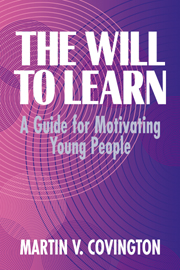Book contents
- Frontmatter
- Contents
- 1 The Future and Its Discontents
- 2 Motives as Emotions
- 3 Motives as Thoughts
- 4 Self-Worth and the Fear of Failure
- 5 The Competitive Learning Game
- 6 Motivational Equity and the Will to Learn
- 7 Strategic Thinking and the Will to Learn
- 8 An Immodest Proposal
- 9 Obstacles to Change: The Myths of Competition
- Epilogue
- Appendixes
- References
- Author Index
- Subject Index
8 - An Immodest Proposal
Published online by Cambridge University Press: 31 January 2011
- Frontmatter
- Contents
- 1 The Future and Its Discontents
- 2 Motives as Emotions
- 3 Motives as Thoughts
- 4 Self-Worth and the Fear of Failure
- 5 The Competitive Learning Game
- 6 Motivational Equity and the Will to Learn
- 7 Strategic Thinking and the Will to Learn
- 8 An Immodest Proposal
- 9 Obstacles to Change: The Myths of Competition
- Epilogue
- Appendixes
- References
- Author Index
- Subject Index
Summary
Had I been present at the act of creation I would have had some helpful suggestions.
AnonymousIt is now time to draw all our recommendations together into a single, unified proposal for educational change. But first, a recap. We argued from the outset in favor of John Dewey's observation (1938/1963) that “the most important attitude that can be formed [in schools] is that of the desire to go on learning” (p. 48). Our analysis of achievement motivation led to a set of instructional guidelines intended to foster the will to learn, which depends largely on establishing a motivational equity.
Then, we added a distinctively cognitive element to these motivational concerns, something also anticipated by Dewey (1938/1963) when he remarked that “all which the school can or need do for pupils, so far as their minds are concerned, is to develop their capacity to think” (p. 152). In contemporary terms, this means strengthening the capacity of students to reflect on their thinking, to create their own mental strategies, and to encourage a view of learning as an ongoing, open-ended process in which meaning is created by the learner, not simply dispensed by authority.
The point of contact between these two educational objectives – one cognitive, the other motivational – is the concept of strategic thinking. A strategy orientation mobilizes the will to learn because it encourages a belief among students that intellectual capacity expands through the wise management of one's mental resources.
Information
- Type
- Chapter
- Information
- The Will to LearnA Guide for Motivating Young People, pp. 200 - 232Publisher: Cambridge University PressPrint publication year: 1997
